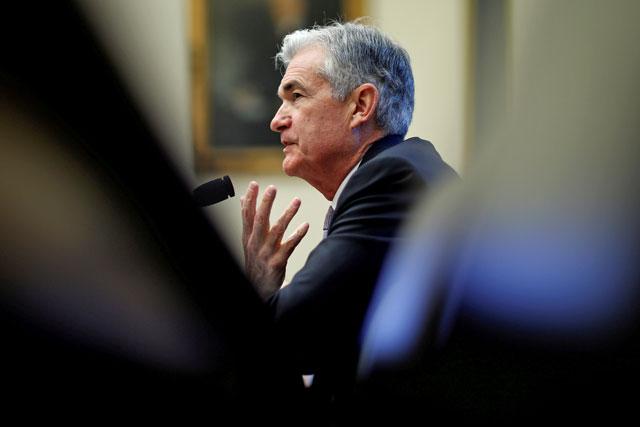You are here
IMF lowers 2014 global growth forecast
By AFP - Jul 24,2014 - Last updated at Jul 24,2014

WASHINGTON — The International Monetary Fund (IMF) lowered its 2014 global economic growth forecast Thursday, warning of “negative surprises” from the United States and China and geopolitical risks in Ukraine and the Middle East.
The IMF projected global growth of 3.4 per cent for this year, down from its April estimate of 3.7 per cent.
In 2013, the world economy grew 3.2 per cent.
The downgraded 2014 growth outlook reflects “both the legacy of the weak first quarter, particularly in the United States, and a less optimistic outlook for several emerging markets”, the IMF said, in an update of its semiannual World Economic Outlook.
The US economy, which accounts for nearly a quarter of the world’s gross domestic product (GDP), shrunk by 2.9 per cent in the first quarter, in part because of severe winter weather.
“An unusually harsh winter conspired with other factors, including an inventory correction, a still-struggling housing market, and slower external demand” to lead the economy to contract by 2.9 per cent in the first quarter, the 188-nation global lender said.
On Wednesday, the IMF lowered its 2014 US growth forecast to a “disappointing” 1.7 per cent, from 2 per cent in mid-June and 2.8 per cent in April.
“It’s really a story of something which has just happened and that is behind us,” said Olivier Blanchard, the IMF’s chief economist.
The IMF is projecting growth will pick up in the US the rest of the year, but not enough to offset the first-quarter drag.
The IMF predicted the improvement would be driven by strong consumption growth, a declining fiscal drag, a pickup in residential investment, and easy financial conditions.
“Risks around this outlook include slowing growth in emerging markets, oil price spikes related to events in Ukraine and Iraq, and earlier-than-expected interest rate rises,” the IMF indicated.
“This makes it critical for the authorities to take immediate steps to raise productivity, encourage innovation, augment human and physical capital, and increase labour force participation,” it stressed.
High poverty
While welcoming a drop in unemployment rate, with the jobless rate falling to 6.1 per cent in June from 7.5 per cent a year earlier, the IMF expressed concern about the high level of poverty in the US.
It said that recent growth since the severe 2008-2009 crisis has left millions of Americans behind, with the latest US government data pointing to almost 50 million Americans living in poverty and the poverty rate stuck above 15 per cent.
To combat rising poverty, the IMF recommended an expansion of the Earned Income Tax Credit and an increase in the federal minimum wage of $7.25 per hour.
The IMF called for a “long overdue” reform of the tax system to boost potential growth, including a reduction in the federal corporate tax rate, which at 35 per cent is the highest among the other 33 industrialised countries in the Organisation for Economic Cooperation and Development.
“Given the substantial slack in the economy, there is a strong case to provide continued policy support to the recovery” that is aimed at reducing poverty and encouraging longer-term growth, it said.
The IMF said that President Barack Obama’s fiscal year 2015 budget offers “various valuable steps that would move towards such a policy mix”.
Those proposed steps include healthcare savings, immigration reform, and measures that limit tax deductions and exclusions for higher earners, the Washington-based institution said.
The Federal Reserve’s (Fed) planned exit from its extraordinarily accommodative monetary policy must be carefully managed to avoid damaging spillover effects on the US and global economies, the fund reiterated.
The IMF suggested the impending rise in the Fed’s key federal funds rate, which has been stuck near zero since 2008 and is expected in mid-2015 by central bank officials, could be pushed back.
With expectations that inflationary pressures will remain muted and full employment only slowly achieved, the Fed has “some scope for policy rates to stay at zero for longer while still keeping inflation under 2 per cent”.
To increase transparency, the IMF recommended that Fed Chair Janet Yellen hold a press conference after each meeting of the policy-setting Federal Open Market Committee.
The IMF expected the expansion in China, the world’s second-largest economy, to be less than previously thought, lowering its forecast to 7.4 per cent from 7.6 per cent.
“In China, domestic demand moderated more than expected,” it said.
In the eurozone, still struggling to recover from recession, the growth estimate was unchanged at 1.1 per cent and the IMF reiterated concern about weak inflation in the 18-nation European bloc.
“In major advanced economies, there is a risk of stagnation in the medium term,” the IMF warned.
Geopolitical risks on rise
The brief update showed the IMF increasingly concerned by escalating geopolitical tensions.
“Geopolitical risks have risen relative to April: Risks of an oil price spike are higher due to recent developments in the Middle East while those related to Ukraine are still present,” the report said.
Russia, the target of recent US and European Union (EU) economic sanctions for its alleged support of separatist fighting in Ukraine, was likely to see its economy brought to the brink of recession this year.
IMF slashed its Russian growth forecast by 1.1 percentage point, to 0.2 per cent, saying “activity in Russia decelerated sharply as geopolitical tensions further weakened demand”.
Emerging-market economies would slow a bit more than previously estimated, to a 4.6 per cent growth pace, but they were not expected to suffer significantly from the eventual US exit from extremely loose monetary policy.
“Emerging market economies — particularly those with domestic weaknesses and external vulnerabilities — may face a sudden worsening of financial conditions and a reversal in capital flows in the event of a shift in financial market sentiment,” the IMF said.
Such a scenario occurred in 2013 when investors abruptly withdrew capital from emerging-market economies anticipating the Fed would raise its key US interest rate, stuck near zero since late 2008. That did not happen, but the Fed is looking to hike the federal funds rate in mid-2015.
“I don’t think we’ll see major financial chaos in the future... but there are going to be bumps,” Blanchard indicated.
Despite the worse-than-expected global growth outlook for 2014, the IMF left its 2015 forecast unchanged at an annual rate of 4 per cent, the fastest pace since 2011.
Related Articles
Growth in emerging markets will slow for a fifth consecutive year, the International Monetary Fund (IMF) said Tuesday, as exchange rate swings and oil prices plunge, and China’s economic growth slows.
WASHINGTON — The Federal Reserve raised interest rates on Wednesday and forecast at least two more hikes for 2018, signaling growing confide
FRANKFURT — Global economic growth will be "disappointing and patchy" in 2016, the head of the International Monetary Fund (IMF), Christine

















